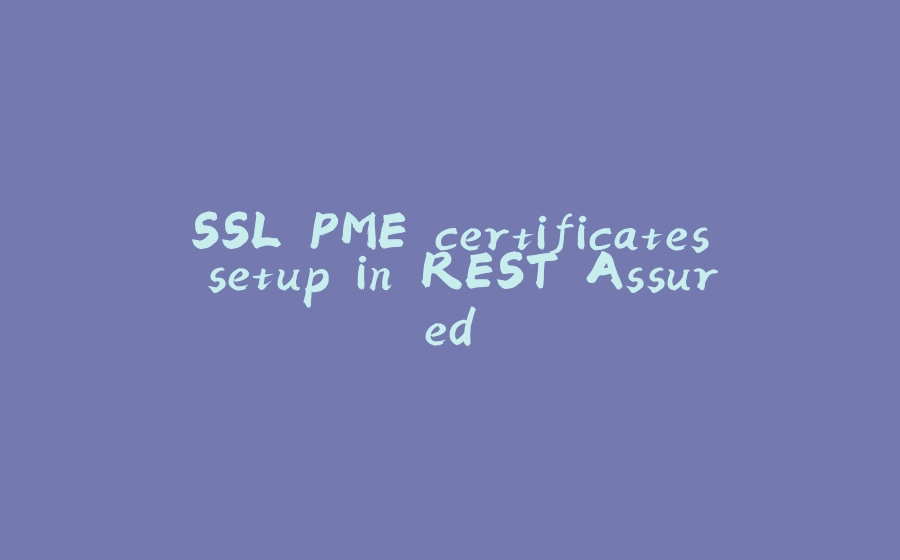Hi everyone,
so recently I was working on a test automation framework using REST-assured that calls an endpoint that requires the use of an SSL certificate.
The SSL certificate was in the PEM format (.crt and .key file) and the code was in Java.
This meant importing the PEM files into a JKS keystore so it could be used in the Java project and creating a helper method to be used during the HTTP request setup.
This guide is for Windows.
Keystore
First you need Java7+ and OpenSSL, after downloading and installing them, add both to your PATH Environment Variables.
Obtain the PEM certificate (.pem, .cer, crt) and its private key (.key). Place the files in a single directory
You’ll also need the private keys passphrase, lets say in this case the passphrase is abcd.
For the keystore password, I’ll be using 123456, it can be anything else but it needs to be at least 6 characters long.
Open the command-line — I’m using PowerShell but you can use any other; and navigate to the folder where you are storing the files, for example, let’s say its under the C:\User\user.name\cert directory.
Optionally, at first, you can add the certificate to your keystore by running the following command:
PS C:\Users\user.name\cert> keytool -import -file certificate.crt -alias example -keystore javaKeyStore.jks Enter fullscreen mode Exit fullscreen mode
After running the command you will be prompted for the password, enter 123456.
The command-line will display the certificate information and ask you do you want to add it to your keystore:
Trust this certificate? [no]: yes Enter fullscreen mode Exit fullscreen mode
Moving on now lets create the keystore.
First create a p12 keystore and after which you can create a JKS keystore.
Run the following command:
openssl pkcs12 -export -in certificate.crt -inkey privateKey.key -certfile certificate.crt -name "certname" -out keystore.p12 Enter fullscreen mode Exit fullscreen mode
You will be prompted for the passphrase so enter abcd after which you will be prompted for the password so enter 123456
If you look in your directory you’ll see the keystore.p12 file you just created.
Next, enter the following command to create the JKS keystore:
keytool -importkeystore -srckeystore keystore.p12 -srcstoretype pkcs12 -destkeystore keystore.jks -deststoretype JKS Enter fullscreen mode Exit fullscreen mode
You will be prompted for the password so enter 123456 .
After doing so you will see the keystore.jks file in the directory.
Project
For this example I have placed the keystore inside the project in the resources folder.
import java.io.FileInputStream;
import java.security.KeyManagementException;
import java.security.KeyStore;
import java.security.KeyStoreException;
import java.security.NoSuchAlgorithmException;
import java.security.UnrecoverableKeyException;
import io.restassured.config.SSLConfig;
public class CertHelper {
public static SSLConfig getSslConfig() {
String password = "123456";
KeyStore keyStore = null;
try {
FileInputStream fis = new FileInputStream("src/main/java/resources/keystore.jks");
keyStore = KeyStore.getInstance("JKS");
keyStore.load(
fis,
password.toCharArray());
} catch (Exception ex) {
System.out.println("Error while loading keystore >>>>>>>>>");
ex.printStackTrace();
}
if (keyStore != null) {
org.apache.http.conn.ssl.SSLSocketFactory clientAuthFactory = null;
try {
clientAuthFactory = new org.apache.http.conn.ssl.SSLSocketFactory(keyStore, password);
} catch (NoSuchAlgorithmException e) {
e.printStackTrace();
} catch (KeyManagementException e) {
e.printStackTrace();
} catch (KeyStoreException e) {
e.printStackTrace();
} catch (UnrecoverableKeyException e) {
e.printStackTrace();
}
return new SSLConfig().with().sslSocketFactory(clientAuthFactory).and().allowAllHostnames();
}
else return null;
}
}
Enter fullscreen mode Exit fullscreen mode
Finally to use the certificate you have to assign it to the config property of RestAssured.
RestAssured.config = RestAssured.config().sslConfig(CertHelper.getSslConfig());
Enter fullscreen mode Exit fullscreen mode
And that is all.
Notes
If you have some trouble regarding the certificate you might need to change the passphrase of the private key (abcd) to be the same as the keystore password (123456).























暂无评论内容